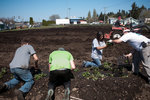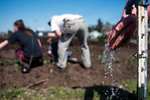



On a sunny Thursday afternoon, teen volunteers got dirty in the mud planting strawberries for a good cause. The fruit is the first of many staple crops that will soon fill the empty garden near The Salvation Army in Centralia.
Danielle Craig, teacher and youth outreach program director, said students from Centralia High School and Lewis County Juvenile Court often volunteer in the garden, learning many life lessons during the process.
“There’s a lot of things growing and a lot of times it’s not just the vegetables; it’s the people,” she said.
Once the ground is tilled, all of the planting, weeding and other garden work is done by hand. This provides a rigorous opportunity for the kids to learn the merit of a long day of work.
“So many of today’s youth don’t know the value of hard work, and when they can put themselves into something that has so much meaning, they believe in themselves,” Craig said. “We see our students’ self confidence and self respect drastically increase.”
For the past two years, the garden has funneled fresh produce into The Salvation Army Food Bank in large quantities. Last year, the crops yielded about 10,000 pounds of fresh vegetables.
This year, the aging flower beds once utilized in the garden have been removed, adding extra space, which in turn results in more work.
With the expansion, Craig said she hopes that number will increase by 2,000 to 3,000 pounds.
Staple crops of the garden include tomatoes, carrots, lettuce, cabbage, green beans and squash, among other fruits and vegetables.
The project is important for both the teens who are involved and the community, Major DeWayne Halstad, with The Salvation Army, said.
“They pick it and see it go out that day,” he said of the volunteers.
It teaches them community leadership, team building, and adds to their resume, but for some, it also serves as a way to earn high school credits they are lacking.
In the summer, the Cultivating Youth Farm Program will run for eight weeks. The participants are from Lewis County Juvenile Court. Through partnerships with the Lewis County WSU Extension Office and Centralia College, the students are able to earn credits to put toward their education.
“We really focus on getting these guys on track to graduate and also giving them the courage to pursue post secondary education,” Craig said. “They get five college credits for that class, and it transfers back to their high school.”
The high schools count the credits toward electives or Career Technical Education classes, Craig said.
“I think it’s breaking stereotypes of teenagers,” she said of the program. “It’s allowing these guys to help break generational cycles, whether that’s poverty because they start to earn work and life skills that are going to help them get a job and help them better themselves.”
Halstad also said many of the students will go home to teach their families how to grow vegetables.
Operating the garden takes a lot of manpower. Each year about 100 volunteers help the process. It’s a community effort, with local businesses helping with donations.
Shannon Murphy-Olson has been part of the project since it first started in 2003 with Growing Places. That was before The Salvation Army brought the garden inside the city limits of Centralia.
She said it is a great way to get youth to volunteer, and also provides a great service to the community.
“It’s been a great asset to the community and to see the youth out here working all summer long and actually having fun, it’s great,” she said.
Future plans include building a greenhouse so the program can run year-round. Later this year, a bee hive will also be added to the garden to help pollinate the plants.